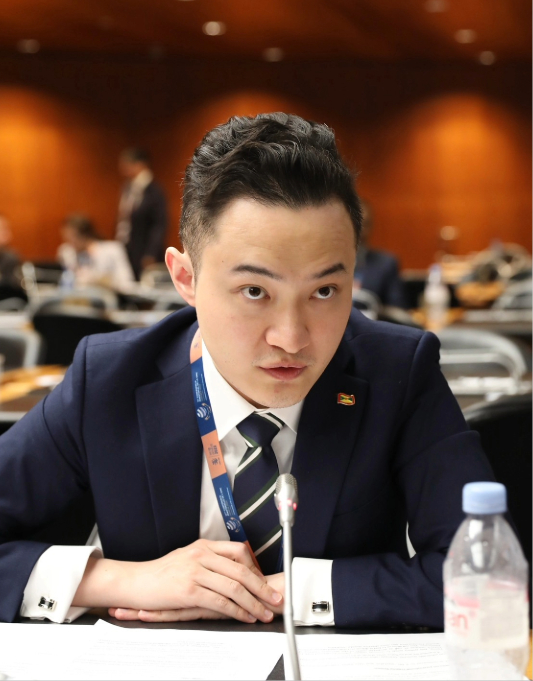- Aria Commodity Finance Fund subject to worldwide asset freeze
- Fund denies allegations of fraud
- Justin Sun admonished by judge for “seeking to mislead” court
A company linked to crypto tycoon Justin Sun is locked in a feud with a commodity trade finance fund over the soured investment of almost half a billion dollars in stablecoin reserves.
Techteryx, which operates the stablecoin TrueUSD, invested US$456mn of the cryptocurrency’s reserves in the Aria Commodity Finance Fund (ACFF) between 2020 and 2022, court judgments show.
In a series of legal battles, the crypto company claims it has been unable to redeem almost all of its investment, alleging that ACFF is “not a genuine fund” and was “perpetrating a fraud”.
Techteryx alleges that, instead of following its stated investment strategy of primarily investing the reserves in trade finance securities, the fund loaned the bulk of the money to related parties within the Aria group.
Lawyers for Aria – a wide network of entities in countries such as Australia, Switzerland and the UAE, ultimately controlled by UK businessman Matthew William Brittain, according to court judgments – have denied the allegations.
They say ACFF is unable to meet the redemptions because Techteryx’s Hong Kong custodian provider has failed to fulfil know-your-customer checks about Techteryx’s ultimate owner.
Aria claims that Sun – best known for spending US$6.2mn on an artwork featuring a banana duct-taped to a wall and eating it – is the true owner of Techteryx.
But the crypto entrepreneur, who in April reportedly extended a loan of undisclosed value to Techteryx to prop up the stablecoin, has described himself only as a creditor and advisor to the company.
He is also offering a US$50mn reward to anyone with “crucial leads” about the unredeemed portion of the reserves sent to the Aria fund, said in court to be around US$400mn.
Techteryx has also accused the stablecoin’s custodian First Digital Trust, its investment advisor, as well as TrueUSD’s former operator, of fraud and breach of trust for their roles in placing the reserves in ACFF. In March, it obtained a worldwide freezing order against Aria Commodities DMCC, an entity that initially received most of the funds.
Aria Commodities, Brittain and a lawyer representing the firm in the Dubai case did not return emails and phone calls from GTR seeking comment.
In comments made in April to crypto publication CoinDesk, Brittain said he “completely rejects Techteryx’s claims against Aria DMCC and any related entities” and claimed “a number of false allegations were made in the court proceedings”.
The case has not yet gone to trial, meaning Techteryx’s allegations are yet to be fully tested in court.
Techteryx, which is registered in the British Virgin Islands, declined to comment.
First Digital Trust said in April that allegations against it are “entirely without merit and factually wrong”, and that it “never moved, or invested, funds without an expressed written instruction from Techteryx or their authorised representative”.

Funds tracing
Techteryx first made the allegations against Aria in a Hong Kong lawsuit in late 2023. More details about the dispute were brought to light earlier this month when a court in Dubai lifted a secrecy order and published a raft of rulings and recordings of hearings.
Aria’s relationship with Techteryx began in early 2021, when the crypto company approved an investment in ACFF that had been recommended by a financial advisor. Over the next year, US$456mn was invested in the fund through share subscriptions.
But in circumstances that remain disputed, the bulk of the investment made by TrueUSD in the Aria fund was sent instead to Aria Commodities, whose owner at the time was Brittain’s wife, court judgments show.
Later, it transpired that no shares in the fund had been issued, which was addressed by creating backdated paperwork with the consent of Techteryx’s custodian provider.
As part of the litigation in Dubai, Aria was asked to attempt to trace the proceeds of Techteryx’s investment.
Brittain gave evidence in Dubai that trade finance facilities and other loans had been made to Aria entities, including in Australia and the UAE. Trade finance loans totalling US$16.5mn were extended to other companies, including in Brazil and Kenya.
Some of the loans were used to purchase Australian solar and wind assets valued at US$125mn, US$60mn went towards grain trading contracts, US$25mn was spent developing two mining concessions in Tanzania, and several million more was used to buy ships, according to a forensic accountancy report commissioned by Aria.
Since March, Aria Commodities has been subject to injunctions preventing the company from moving cash or assets from Dubai up to a value of US$456mn, a Dubai court judgment published this month shows.
“It is not possible to identify which (if any) payments were used to fund investments in asset-backed, credit-insured short term commodity finance transactions,” Justice Michael Black wrote in an October judgment continuing the asset freeze on Aria Commodities.
Justice Black found the “factual analysis more than supports the conclusions that the manner in which the investment of the [reserves] was made was highly irregular and that there are serious issues to be tried as to whether the monies were diverted from the [Aria] fund to [Aria Commodities] in order to support liquidity within the Aria Group rather than used for the purposes stated in the fund documentation”.
Justice Black said Brittain’s written evidence to the court “seems calculated to obfuscate and confuse” and “riddled with internal inconsistences and anomalies”.
“I am left with the impression that there is a real risk that he would cause [Aria Commodities] to dispose of its assets in a way to frustrate the enforcement of any judgment,” he wrote.
Justice Black only determined that there was a “serious issue to be tried” in the Hong Kong proceedings in order to continue the freezing injunctions until the conclusion of a trial, and did not make a comprehensive verdict on Techteryx’s allegations.
Justice Black also found there were “clearly serious issues to be tried” related to US$15mn in “referral fees” paid by Aria Commodities to a company that Techteryx says is linked to First Digital Trust and its investment advisor.
The TrueUSD reserves are the only current investment in the fund, according to the Dubai judgments.
In 2020, ACFF said in a press release that Singaporean bank OCBC would issue notes for the fund, but the Dubai judgment said it was unclear if the notes were provided. OCBC did not respond to a request for comment from GTR.
Earlier this year, Aria proposed securitising the fund’s assets and issuing notes to Techteryx in lieu of cash redemptions. But the suggestion was rejected by Techteryx, which won a court injunction preventing the securitisation in April.

Surprise court appearance
When Techteryx purchased TrueUSD’s operating entity from its previous owner in 2021, speculation swirled in crypto circles that the little-known company was controlled by Sun, which his spokesperson denied when asked by the Wall Street Journal in 2023.
Founder of blockchain company Tron, the Chinese-born businessman has long been a controversial figure in the crypto world.
He is reportedly one of the biggest purchasers of a cryptocurrency issued by World Liberty Financial, which is owned by the Trump family. In 2023, he was hit by fraud and other charges by the US securities regulator, which have since been stayed pending negotiations.
In April this year, Sun came forward as a “supporter” of TrueUSD during a press conference in Hong Kong. Sitting in front of a banner reading “First Digital Trust’s Diversion of Public Trust Funds and Aria Investment Scam”, he called for reforms to the city’s trust laws.
But two weeks before the event, Sun had appeared to reveal links to TrueUSD and Techteryx.
One of the first hearings in Techteryx’s application for the freezing order was interrupted when the barrister representing Aria Commodities noted that a person with the screen name of “Bob” had entered the online meeting.
After a court official asked “Mr Bob” to turn on their camera, Justice Black asked for his full name.
Speaking from an office and wearing a plain black shirt, “Bob” identified himself as “Yuchen Sun” and said several times he was with Loeb & Loeb, the law firm representing Techteryx in Hong Kong.
Shortly afterwards, a visibly taken-aback Tom Montagu-Smith, Aria’s barrister, asked: “Are you Justin Sun? Are you a lawyer?”
“I’m not a lawyer, I’m a client of Loeb,” Sun responded, adding he was an “advisor” to Techteryx.
But Montagu-Smith told the judge: “This is Justin Sun.
“He’s actually quite a well-known individual, and he’s suspected to be the ultimate beneficial owner of Techteryx, which is part of what has caused the KYC problems. But he’s not being straightforward about who he is [in the hearing],” Montagu-Smith said.
Sun then left the hearing at Justice Black’s request.
Montagu-Smith said Sun’s suspected ownership of Techteryx was “part of the problem” of why Aria had not been able to meet the redemption requests in cash.
The broadcast of the hearing was made publicly available in late October. Referring to the episode in a judgment, Justice Black wrote that Sun had tried to “gate-crash” the hearing, “undoubtedly seeking to mislead the court as to his identity”.
“I find that conduct quite bizarre. If Mr Sun is in some way associated with Techteryx he could simply have attended the hearing [as] a party representative. The court does not look favourably on attempts to mislead, and such conduct risks a finding of contempt in the face of the court and a fine.”
Sun did not respond to a request for comment from GTR sent to his company Tron.







